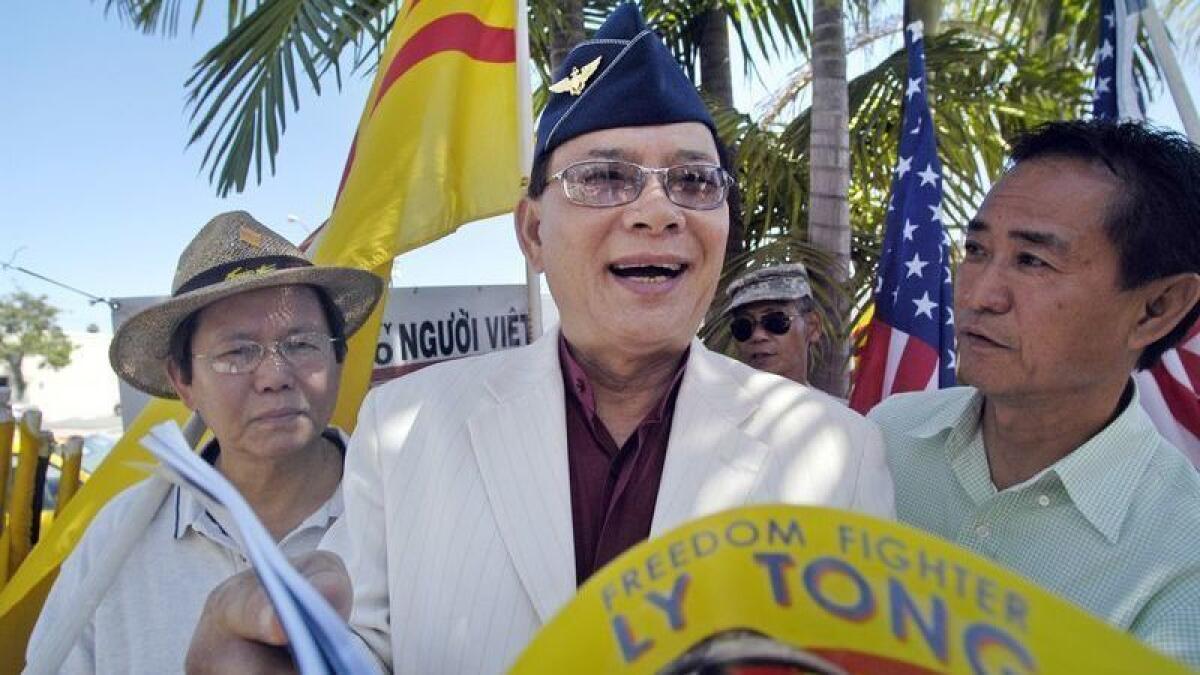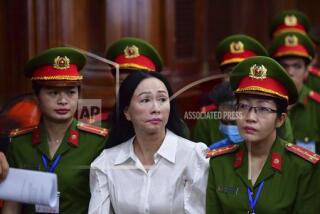Ly Tong, ex-fighter pilot known as the ‘Vietnamese James Bond,’ dies at 74

Ly Tong, the former fighter pilot known as the “Vietnamese James Bond” for his daring stunts — including hijacking a plane to drop 50,000 political leaflets over his homeland, calling on citizens to overthrow the communist government — died Friday night in San Diego. He was 74.
Last month, Tong was hospitalized and doctors diagnosed him with lung disease. He slipped into a coma on March 21, with his stay at Sharp Memorial Hospital drawing hundreds of visitors, some of whom called him a hero for his constant attacks against Hanoi’s oppressive regime.
Hoa Thai Cu, president of the South Vietnamese Air Force Assn. of San Diego who has been handling Tong’s medical care, said he had just paid the patient’s April rent and extended his housing lease — optimistic that he would recover.
“Many people have been worried because they are looking for strong anti-communist voices and he was that voice for so long,” Cu added.
While members of an older generation of Vietnamese admired Tong’s fighting spirit, many younger people acknowledged that they had never heard of him — nor did they care to involve themselves in community politics.
Tong became famous in 1992 when he hijacked an Airbus A310 on a charter flight for Vietnam Airlines. The jet had departed Bangkok and was about 80 miles from Ho Chi Minh City, formerly known as Saigon, when Tong flashed a plastic knife and coat hanger and claimed that he had a bomb, according to the Aviation Safety Network.
He ordered a flight attendant to take him to the cockpit, where he directed the Bulgarian captain to fly low. Quickly, he released sacks stuffed with fliers out of the cockpit window. The leaflets urged Vietnamese to “build an independent, free and prosperous Vietnam.” He signed it: “Commander of the Uprising Forces.”
He parachuted from an emergency exit into a swamp, where the Vietnamese government arrested him two hours later. No one aboard the aircraft was harmed.
His sentence of 20 years in prison was cut short after the U.S. and Vietnam normalized relations. Tong was granted amnesty in 1998.
Tong joined the South Vietnamese Air Force and at 17 was assigned to the Black Eagle fighter squadron. In the 1970s, his A-37 jet was shot down, and at the end of the Vietnam War, the North Vietnamese imprisoned him, sending him to reeducation camp outside the coastal city of Nha Trang.
He escaped from camp in 1980 and in 1984, after resettling in Louisiana, he graduated from the University of New Orleans and moved to San Jose, where he got involved in community politics, joining protests and eventually writing books on Vietnamese history and culture.
In January 2000, Tong rented a Cessna, flying from Florida to Cuba to distribute newspapers urging citizens to revolt against the government of Fidel Castro.
As punishment, he lost his pilot’s license, but later that year he offered a flight instructor $10,000 to depart Bangkok in a single-engine plane — again heading to the former Saigon to drop thousands more leaflets, demanding armed demonstrations against the communists.
Police took him into custody when he returned to Thailand, where he was convicted and imprisoned before returning to the U.S.
Tong, born Le Van Tong, is survived by a brother, sister and three daughters. Cu and other organizers are making plans for a memorial service in Orange County’s Little Saigon, the largest business and cultural district for the Vietnamese outside of Vietnam.
More to Read
Sign up for Essential California
The most important California stories and recommendations in your inbox every morning.
You may occasionally receive promotional content from the Los Angeles Times.










